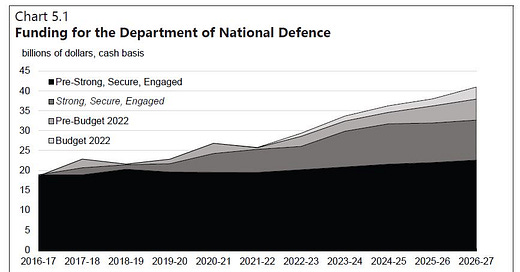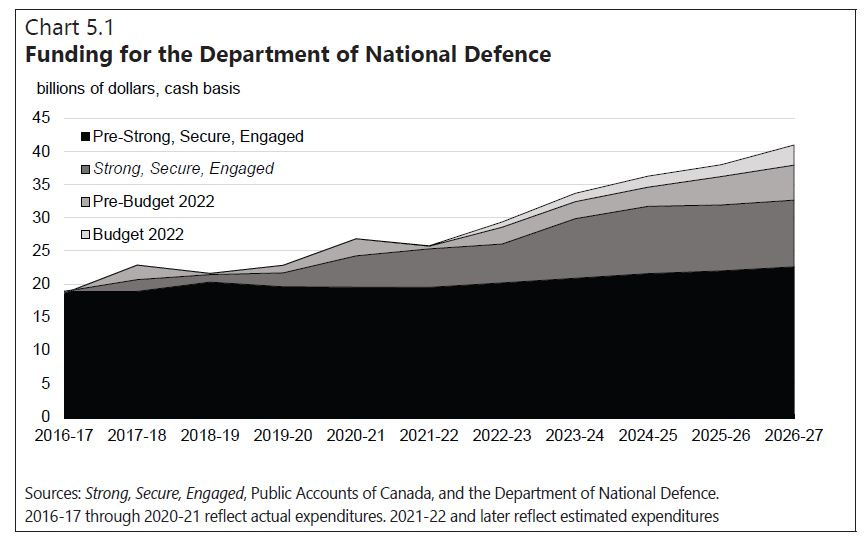Liberal government presents a contradictory military budget for 2022
Let’s take a look at the big $8-billion boost
Deputy Prime Minister and Finance Minister Chrystia Freeland presented the Liberal Party’s first federal budget since being re-elected as a minority government last year. It’s also the first budget to be tabled under the new confidence-and-supply agreement struck between the Liberals and the New Democrats.
The terrible Russian invasion of Ukraine has put Western governments under tremendous pressure to increase military spending, and Canada’s defence spending is on track to double between 2016-17 and 2026-27.
National Defence: Planned increases on top of planned increases
But does the government's plan for roughly $8-billion over five years in more military spending make sense?
Some have complained that the budget lacks specifics in several key spending areas – including defence spending. The government says that the new increases – on top of previous increases – will be largely allocated following a future review of Canada’s Defence Policy.
But already we can see many contradictions in the government's plans for military spending.
Rewarding an anti-woman culture?
First, this is a government that takes pride in championing the rights of women and girls, and a Prime Minister who is a proud feminist. So how could we make this massive infusion of money to a federal department that is rife with sexual misconduct, harassment, and cover-ups?
The budget allocated $245 million over six years to support “culture change,” and admits, “those who serve Canada with our flag on their shoulder contend with enough risks to their safety. Their workplace should not be one of them.” But a massive $8-billion blank cheque sends the wrong message to the warped anti-women culture that reaches right to the top of the military’s headquarters.
Canada’s defence spending is on track to double between 2016-17 and 2026-27.
BUDGET 2022
Buying jets the Liberals promised to never buy?
Second, billions of defence dollars will be spent to buy a fleet of controversial F-35 stealth fighters. On the campaign trail in 2015, Liberal Leader Justin Trudeau lambasted the Harper Conservatives and said the F-35 would be a “nightmare” for Canadian taxpayers, and promised to not buy the jets. Now he is going ahead with a fleet of 88 F-35 stealth fighters, which is almost two dozen more planes than the Harper Conservatives announced they would buy in 2010 when they were in power.
Boosting spending when Canada is already the 6th highest in NATO?
Third, the military spending boost is intended to address what is generally seen as Canada’s low level of military spending within the NATO military alliance, when in reality Canada is near the top. The public cannot be faulted for this misperception given the repeated airing of the unopposed views of generals and defence lobbyists on the media (I’m looking at you, CBC) arguing Canada is near the bottom of the list in terms of defence spending as a percentage of Canada’s GDP.
However, NATO’s own figures also compare members’ spending in actual dollars, and using this much more accurate portrayal of military might Canada is sixth highest in the alliance behind the three big nuclear powers (U,S., U.K., and France) and two more countries that the host U.S. nuclear weapons (Germany and Italy).
Last month Defence Minister Anita Anand told the CBC she was taking three budget increase requests to Cabinet; somewhat less than NATO’s target of 2% of GDP, reaching 2% GDP, and going beyond 2% GDP – a level that would cost roughly $25-billion a year according to the Parliamentary Budget Officer.
We may have only the Liberal NDP confidence-and-supply agreement to thank for the $8-billlion increase to National Defence being the lesser of these three scenarios, as NDP Leader Jagmeet Singh quite correctly referred to the 2% GDP target as being completely “arbitrary,” though he supports increasing military spending.
To be sure, the awful Russian invasion of Ukraine has dramatically shaken the public’s sense of security, and strengthened the defence lobby’s hand, so the shift of public dollars from other priorities, such as social and health programs, to the military could have been much higher.
(Cover: Canada's Minister of Foreign Affairs Chrystia Freeland during visit to Kyiv, Ukraine, 08 May 2019. Via Shutterstock)




